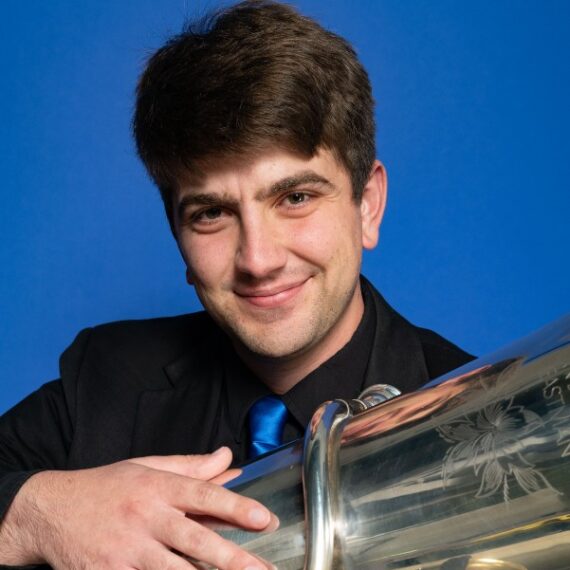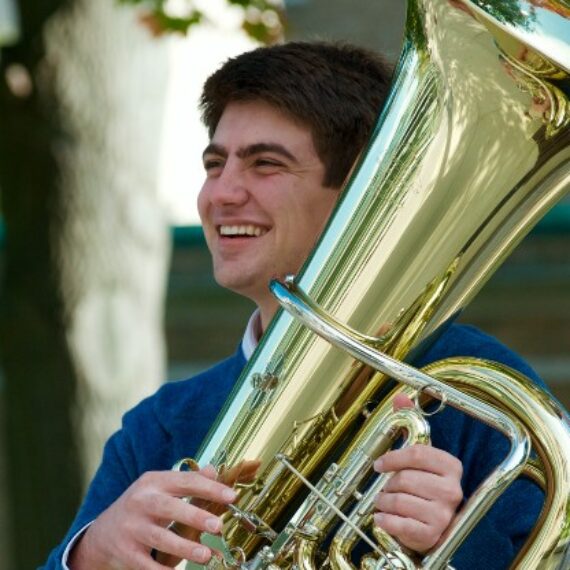Awards/Competitions
2nd Place, 2023 ITEC Arnold Jacobs Mock Audition Competition; Semi-Finalist, 2020 NERTEC Solo Artist & Mock Audition Competitions; Semi-Finalist, 2019 & 2020, Falcone International Tuba-Euphonium Conference Solo Artist Competition
Appearances
Monteux School and Music Festival, 2019–21; New Jersey Symphony, 2023; Queens Symphony, 2022; West Point Band, 2022; Albany Symphony Orchestra, 2021; Brooklyn Chamber Orchestra, 2021
Was there a teacher who was particularly impactful/helpful? What made this instructor stand out?
The teacher that was particularly impactful in my musical journey was my undergraduate tuba professor, Dr. John Bottomley. I had studied with him prior to college as well, which added up to eight years as my primary teacher. Of course he was instrumental in my development as a player and a musician, but most importantly, he cared about his students as humans as well. He instilled that the key to success is not only the drive to improve your skills, but is also treating people with the utmost kindness along the way.
What made you decide to become a musician? Was there a particular performance or person that influenced your decision?
I originally joined band class to hang out with my friends in elementary school. I had never been in a music class prior, but I certainly did not want to be left out. Over time, I fell in love with the class itself and stuck with it. Here we are 15 years later (12 of which have been on tuba), and I still get the same excitement when playing.
How did you hear about TŌN? What inspired you to apply?
I originally heard about TŌN through my roommate, whose professor recommended it as a next step in our academic careers. The part that truly inspired me to apply was the on-the-job training that we would receive. My ultimate goal is to play in a full-time orchestra, so this is a perfect way to learn the daily life of a professional musician.
How would you like to see orchestra concerts evolve in the future?
I would like to see orchestra concerts cater more towards the general public. Classical music in general has a long history of appealing to the wealthy and “elite” members of society, but it is long past time to bridge the gap to all communities. It should be our job to work toward making connections to the cities that we are in, and being a force for social change and improvement.
What is the most memorable performance you ever had?
The most memorable performance I ever had was probably the first orchestra concert I played in following the onset of the pandemic. As a musician, it was an incredibly challenging time, without any ensembles as an outlet for creativity. When the risk finally fell far enough to put on a full orchestral concert, it felt as if life was coming back to normal. It was a moment that had been a long time coming, and to finally collaborate with 60+ musicians again reminded us what we were all studying for.
Can you share any memorable onstage mishaps?
Almost every tuba player (including myself) has a story of a valve slide falling out during a concert. Oftentimes, the tuba player in an orchestra will have a good number of rests in a given piece. During this time, you will notice that we will flip over our horn to put it bell-side down on the floor. With this, the slides end up pointed downwards, leaving them vulnerable to falling out. Usually, we are used to this and remember to secure it to prevent this from happening, but mistakes happen. This will undoubtedly occur during the quietest moment in a piece, where the orchestra is at their quietest dynamics, with the most delicate melodies, and then out of nowhere comes the loud sound of metal falling on metal. From there, all you can do is hold back a laugh and accept that all of the musicians on stage will turn around and look right at you.
If you weren’t a musician, what would you be doing?
If I was not a musician, I would probably have gone into engineering. As long as I can remember, I have had an interest in science and math, and using these to contribute to technological innovation seems like such an interesting and fulfilling job.
What is a surprising part of playing your instrument that you think most people don’t know?
One surprising part of playing the tuba is not only the size, but the fact that many times we have to bring two of them to the gig. Just like how trumpet players switch horns depending on the repertoire, modern American tuba players are usually equipped with both a contrabass tuba and a bass tuba.
What is the biggest challenge and/or surprise about playing in an orchestra?
Unlike other sections in the orchestra, the tuba player is almost always alone on their instrument. To me, this can be fun, but it is also challenging, since you are providing all of the tuba sound for the entire orchestra. Especially in larger works, the numbers are stacked against you to be heard.
What advice would you give your younger self or anyone starting out?
Perfection is never the ultimate goal in music; in fact, it is pretty much impossible at any level. Just try to create the most beautiful music you can at this very moment.




